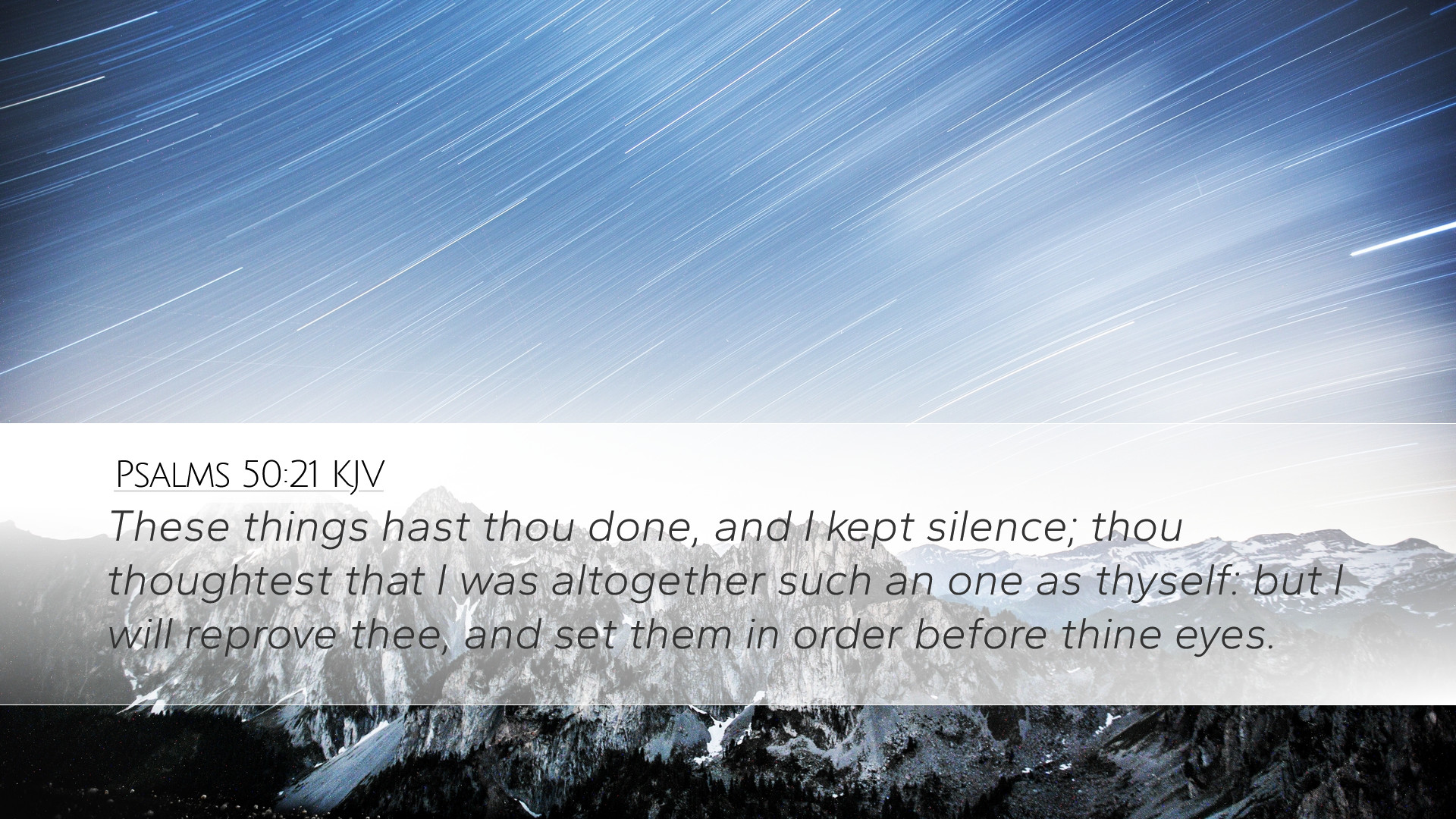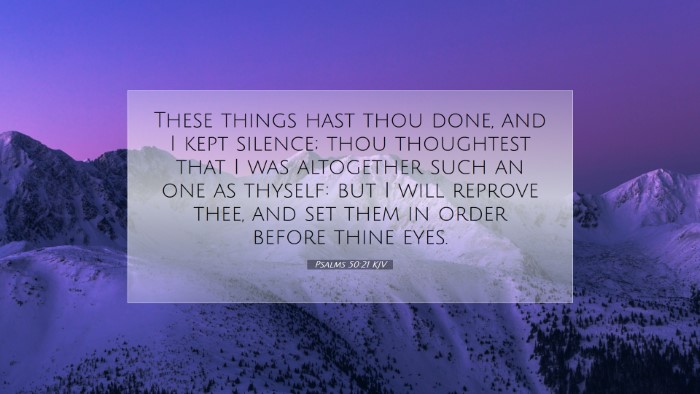Psalms 50:21 - Biblical Commentary
Verse: "These things hast thou done, and I kept silence; thou thoughtest that I was altogether such an one as thyself: but I will reprove thee, and set them in order before thine eyes."
Introduction
The message in Psalms 50:21 is both solemn and revealing, addressing the false assumptions of humanity regarding God's nature and His judgments. This commentary seeks to explore the depths of this verse by synthesizing insights from renowned public domain theologians such as Matthew Henry, Albert Barnes, and Adam Clarke.
The Context of Psalms 50
The entire Psalm is a clarion call to God’s people, emphasizing His rightful authority and judgment. The passage indicates a time of reckoning, where the silence of God does not equate to approval of sinful behaviors. Each commentator approaches this context with a unique emphasis:
-
Matthew Henry:
Henry explains that God’s silence in bearing with the wicked for a time can lead to misconceptions about His character. The continued sin of the wicked leads them to believe God is indifferent to their actions.
-
Albert Barnes:
Barnes indicates that false assumptions about God often arise when individuals equate divine tolerance with endorsement. By not immediately punishing sinners, they mistakenly presume equality with God.
-
Adam Clarke:
Clarke notes that God's seeming inactivity does not diminish His ultimate authority and justice. It serves as a preparation for the eventual reproof and judgment that He will deliver.
Analysis of Key Phrases
The verse can be dissected to gain richer insight, especially into the key phrases presented:
-
"These things hast thou done, and I kept silence":
This serves as an indictment. God’s silence is not acquiescence; rather, it is a divine restraint that allows time for repentance, as emphasized by Henry.
-
"Thou thoughtest that I was altogether such an one as thyself":
Here, the folly of equating divine patience with human permissiveness is vividly portrayed. Clarke points out the absurdity in attributing human traits to God, thus revealing an understanding of God's nature that is skewed by personal sin.
-
"But I will reprove thee, and set them in order before thine eyes":
This declaration showcases God's impending judgment, highlighting the importance of accountability. Barnes emphasizes that God’s reproof is aimed not to destroy but to enlighten the sinner, offering a path of redemption.
Theological Implications
The implications of this verse extend beyond its immediate context into broader theological terrains:
-
God’s Justice:
God’s eventual reproof serves as a reminder that His justice will prevail. Henry speaks to the inevitability of divine judgment and the necessity of fearing the silence of God as it may signal pending correction.
-
Misunderstanding of God:
Barnes elucidates that seeing God merely as a permissive entity diminishes the gravity of sin and the holiness of God. The verse calls for a reassessment of how humans perceive divine nature and their relationship with the Creator.
-
Call to Repentance:
Clarke interprets this message as an urgent call for self-examination and repentance. The acknowledgment of one’s faults is essential before the presence of a holy God who reproves sin.
Practical Applications for Today
For pastors, students, theologians, and scholars, this verse carries profound relevance, calling them to deeper understanding and reflection on several levels:
-
Ethical Reflection:
It challenges individuals to consider the nature of their actions and whether they live under the assumption that God’s silence equals approval. Engaging in self-reflection can lead to transformative change.
-
Proclamation of Truth:
Pastors are reminded that God’s silence should not be misconstrued as a lack of authority. Their responsibility is to proclaim the truth of God's nature, holding firm to the notion that God will ultimately judge sin.
-
Encouraging Authentic Worship:
True worship is born out of a genuine understanding of God’s nature—a God who desires holiness and truth. This verse prompts congregations to pursue a relationship with God that is not rooted in misunderstanding.
Conclusion
Psalms 50:21 serves as a potent reminder of the nature of God and His relationship with humanity. Through the insights of Matthew Henry, Albert Barnes, and Adam Clarke, we discover that God's silence should never be confused with apathy. Instead, it is a preparation for His reproof, a divine challenge to understand Him wholly and to embrace a life of accountability. In the light of this understanding, let those who profess faith dedicate themselves to deeper engagement with the truth of Scripture, resulting in a transformed life that reflects the holiness of God.


